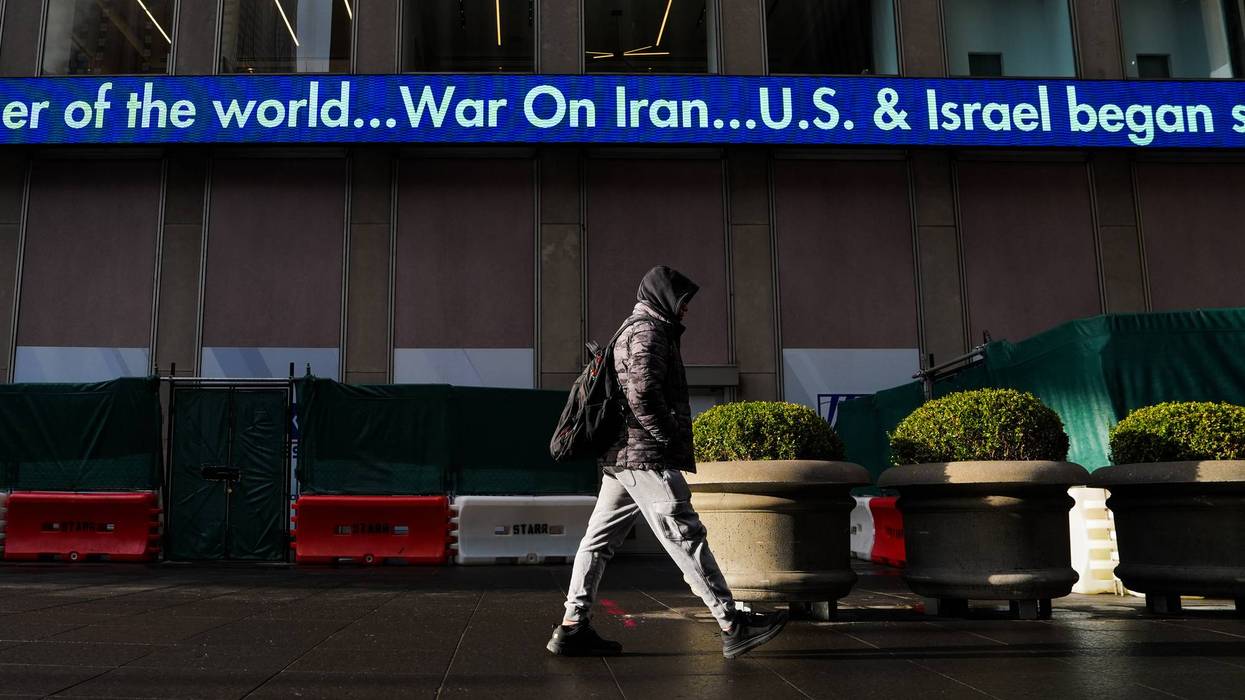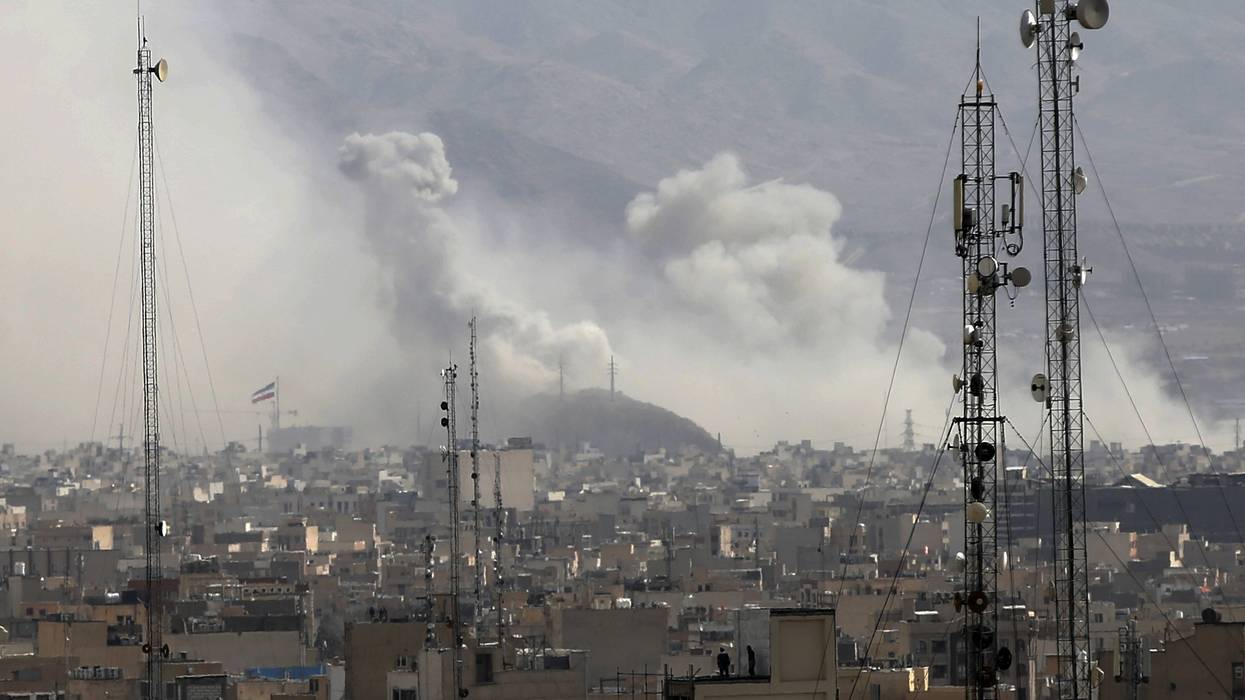July, 30 2019, 12:00am EDT

Coalition of Foreign Policy Experts Outline 8 Recommendations to Deescalate Tensions with Iran
Today, an expert group of foreign policy practitioners published a letter underscoring the dangerous new phase that has put the U.S and Iran on the path toward war. The signatories include prominent academics, such as John Mearsheimer, Stephen Walt, and Andrew Bacevich; foreign policy analyst Rula Jebreal; former Member of Congress John F.
WASHINGTON
Today, an expert group of foreign policy practitioners published a letter underscoring the dangerous new phase that has put the U.S and Iran on the path toward war. The signatories include prominent academics, such as John Mearsheimer, Stephen Walt, and Andrew Bacevich; foreign policy analyst Rula Jebreal; former Member of Congress John F. Tierney; former ambassadors and diplomats, such as Thomas Pickering, Francois Nicoullaud, and Peter Jenkins; national security expert Edward Price; and Iran experts such as Jamal Abdi, Dina Esfandiary, and Farideh Farhi.
The letter outlines a series of eight bold but practical recommendations to the U.S., Iran, and Europe that could widen the path to diplomacy that has narrowed considerably since the U.S. initiated a tit-for-tat ratcheting up of tensions with Iran.
The signers urge the U.S. to suspend recent sanctions to provide space for deescalation and Iran to return to full compliance with its obligations under the nuclear deal. After these initial trust-building steps, the signers recommend further negotiations aimed at a prisoner swap and an Incidents at Sea agreement to calm tensions in the Persian Gulf.
The full text of the letter and signatories is below and can be found on the web here.
Expert Letter on Deescalating with Iran
July 30, 2019
As foreign-policy practitioners with decades of collective experience in national security and diplomacy, we write to warn that U.S.-Iran tensions have entered a dangerous new phase that has put us on the brink of a disastrous and avoidable war. The administration's decision to violate the Iran nuclear agreement in pursuit of a so-called maximum pressure strategy is damaging the accord and U.S. interests in ways that could be difficult to reverse. There remains a narrow path for the U.S. and Iran to avoid military conflict and resolve ongoing disputes through negotiations. Doing so, however, will require bold action and constructive steps from all sides, as outlined below.
The U.S. Should Suspend Recent Sanctions to Provide Space for Diplomacy
- The U.S. should suspend sanctions imposed after its withdrawal from the nuclear accord with Iran in May 2018 to provide space for de-escalation and assurance that it is serious about pursuing and adhering to a negotiated solution.
Iran Should Return to Full Compliance with the Nuclear Accord
- Iran's recent decision to cease adherence with aspects of the July 2015 nuclear deal in response to U.S. sanctions feeds into a counterproductive escalatory cycle and could lead to an irreversible collapse of the agreement. Iran should welcome the suspension of U.S. sanctions by returning to full compliance with the nuclear deal.
The U.S. and Iran Should Pursue a Prisoner Swap
- Iran has unjustly imprisoned at least five American citizens and dual nationals. According to publicized reports, at least a dozen Iranians are in custody in the U.S. on sanctions violation charges. Iran has publicly and privately offered to arrange a swap of American and Iranian prisoners held in each country's jails. The Trump administration should pursue this overture and view it as the low-hanging fruit for negotiations that can build confidence for broader diplomacy.
Europe Must Take More Serious Steps to Address Challenges in Meeting Its Sanctions Relief Obligations
- Due to U.S. extraterritorial sanctions, Europe has not been able to satisfy its obligations under the nuclear deal to ensure legitimate trade with Iran. To its credit, Europe's development of a special financial mechanism to facilitate legitimate trade with Iran, known as INSTEX, is a constructive first step forward. Europe must now urgently take all necessary actions to ensure INSTEX is utilized to enable the trade and economic benefits promised under the nuclear deal.
The U.S. and Iran Must Reestablish Communication Channels
- The U.S. and Iran should reestablish a permanent and direct communication channel with Iran to de-escalate crises, such as the downing of the U.S. drone and the oil tanker attacks in the Gulf of Oman. Absent a dedicated channel for deconfliction and deescalation, as existed under the previous administration, the chances of disaster remain far too high.
The U.S. Should Appoint a Credible and Empowered Iran Envoy
- To signal U.S. seriousness about negotiations and to facilitate the process, a new Iran envoy with the ear of the President and experience in diplomatically engaging Iran is needed. As long as John Bolton and Mike Pompeo are viewed as leading the administration's Iran policy, concerns that the U.S. seeks regime change and military action - and is not serious about a negotiated solution - will undermine any hopes for talks.
Pursue an Agreement to Avoid Confrontations in the Persian Gulf
- The U.S. and Iran came dangerously close to war following several incidents in the Persian Gulf and unverified accusations leveled by both sides. To avoid similar confrontations in the future, the two sides should negotiate an "incidents at sea" agreement to avoid collisions between their naval and air forces operating in close proximity.
U.S. Congress Should Pass Legislation to Prevent War
- Congress was not consulted when President Trump came just a few minutes away from attacking Iran, which could have dragged the U.S. into a major regional conflict far more damaging than the Iraq war. Congress must assert its war-powers authority and uphold its constitutional duty as a coequal branch of government by passing legislation to ensure the administration cannot start an illegal and disastrous war with Iran.
Signatories:
Jamal Abdi, President, National Iranian Amerian Council
Arshin Adib-Moghaddam, Professor in Global Thought and Comparative Philosophies at SOAS, University of London and Fellow of Hughes Hall, University of Cambridge
Sanam Naraghi Anderlini, Founder and CEO, International Civil Society Action Network (ICAN)
Andrew Bacevich, Co-founder, Quincy Institute for Responsible Statecraft
Juan Cole, Richard P. Mitchell Collegiate Professor of History at the University of Michigan
Michael C. Desch, Packey J. Dee Professor of International Relations, University of Notre Dame
Dina Esfandiary, Fellow, International Security Program, Belfer Center for Science and Security Studies, Harvard University; Fellow, The Century Foundation
John L. Esposito, Professor of Religion & International Affairs and Islamic Studies at Georgetown University
Farideh Farhi, Affiliate Graduate Faculty of Political Science, University of Hawai'i at Manoa
Nancy W. Gallagher, Director, Center for International and Security Studies at Maryland and Research Professor of Public Policy, University of Maryland
Mark Gasiorowski, Professor, Department of Political Science, Tulane University
Kevan Harris, Assistant Professor of Sociology studying development and social change in the global South, UCLA
Rula Jebreal, Professor, American University of Rome
Peter Jenkins, Former UK Ambassador to the IAEA
Bijan Khajehpour, Managing partner at Vienna-based Eurasian Nexus Partners, a strategy consulting firm focused on the Eurasian region
Lawrence Korb, Senior Fellow at the Center for American Progress, former Assistant Secretary of Defense (1981-1985)
Peter Kuznick, Professor of History and Director, Nuclear Studies Institute, American University
Joshua Landis, Sandra Mackey Professor of Middle East Studies and Director of the Center for Middle East Studies at the University of Oklahoma
Daniel Larison, Senior Editor, The American Conservative
John J. Mearsheimer, R. Wendell Harrison Distinguished Service Professor of Political Science, University of Chicago
Francois Nicoullaud, Former French Ambassador to Iran
Rouzbeh Parsi, Visiting Research Scholar, Sharmin and Bijan Mossavar-Rahmani Center for Iran and Persian Gulf Studies, Princeton University; Head of the Middle East and North Africa Programme at the Swedish Institute of International Affairs -Stockholm; Senior Lecturer, Human Rights Studies, Lund University.
Trita Parsi, Co-founder, Quincy Institute for Responsible Statecraft; Adjunct Associate Professor, Georgetown University
Thomas R. Pickering, former Under Secretary of State and Ambassador to Russia, India, the United Nations and Israel.
Paul Pillar, Nonresident Senior Fellow at the Center for Security Studies at Georgetown University and Nonresident Senior Fellow in Foreign Policy at the Brookings Institution
Edward Price, Director of Policy and Communications, National Security Action; former National Security Council Spokesperson; Former Special Assistant to President Obama for National Security Affairs
Barbara Slavin, director of the Future of Iran Initiative at the Atlantic Council
John F. Tierney, former Member of Congress and Executive Director of Center for Arms Control and Non-Proliferation and of Council for a Livable World
Stephen Walt, Robert and Renee Belfer Professor of International Affairs, Harvard Kennedy School
Lawrence Wilkerson, Visiting Professor of Government and Public Policy at the College of William & Mary and former chief of staff to Secretary of State Colin Powell
The National Iranian American Council (NIAC) is a nonpartisan, nonprofit organization founded in 2002 to give voice to the Iranian-American community. From being the trusted voice on U.S.- Iran relations, to pushing forth legislation that protects individuals of Iranian heritage from systematic discrimination, to celebrating our cultural heritage, NIAC creates a lasting impact in the lives of the members of our community.
(202) 386-6325LATEST NEWS
'The Behavior of Rogue States': Global Revulsion as US and Israel Launch War on Iran
"The attacks on Iran by Israel and the United States are illegal, unprovoked, and unjustifiable," said Jeremy Corbyn, an independent member of the UK Parliament.
Feb 28, 2026
Elected officials, activists, and experts around the world voiced horror and outrage Saturday as US President Donald Trump and Israeli Prime Minister Benjamin Netanyahu jointly launched an illegal war on Iran with the explicit goal of toppling the nation's government, sparking chaos throughout the Middle East.
The wave of bombings, expected to mark the beginning of a wider assault, spurred airspace closures and flight cancellations across the region as countries braced for the fallout. While European leaders offered milquetoast responses to the unlawful military attack and Canadian and Australian officials openly endorsed it, leftist politicians and others unequivocally condemned the US and Israel as the aggressors.
"The attacks on Iran by Israel and the United States are illegal, unprovoked, and unjustifiable," said Jeremy Corbyn, an independent member of the British Parliament and former leader of the UK Labour Party. "Peace and diplomacy was possible. Instead, Israel and the United States chose war."
"This is the behavior of rogue states—and they have jeopardized the safety of humankind around the world with this catastrophic act of aggression," Corbyn added. "Our government must condemn this flagrant breach of international law, and urgently pursue a foreign policy based on justice, sovereignty, and peace."
Progressive International co-founder Yanis Varoufakis, the former finance minister of Greece, echoed Corbyn's criticism of the US and Israel as "rogue states."
"Israel and the USA," he wrote on social media, "have started a war not against Iran but against the whole world. We stand with Iranians, with humanity, against the notion that Israel and the US can bomb anyone their fancy takes them to bomb."
Badr Albusaidi, the foreign minister of Oman and the mediator of recent US-Iran talks, said he was "dismayed" by news of the US-Israel attacks on Iran, which were quickly followed by reports of horrific atrocities. Albusaidi said hours before the bombs started falling on Iran that a diplomatic resolution was within reach.
"Active and serious negotiations have yet again been undermined," Albusaidi lamented on Saturday. "Neither the interests of the United States nor the cause of global peace are well served by this. And I pray for the innocents who will suffer. I urge the United States not to get sucked in further."
Leftist Colombian President Gustavo Petro said he believes "President Donald Trump has made a mistake today" and implored the "helpless United Nations" to "convene immediately" in response to the US-Israel attacks and retaliation by Iran and allied groups in the region.
Iran vowed a "crushing" response to the US-Israeli onslaught, firing drones and missiles at Israel and pledging to hit US military installations in the region.
Al Jazeera reported that "Iran has targeted United States assets across the Gulf Arab states in retaliation for a huge joint attack on Iran by the US and Israel, as the region’s worst fears of being ignited in the flames of a sustained war loom."
"The Iranian government on Saturday confirmed its attacks on several targets, according to the Fars news agency, including Bahrain, Kuwait, Qatar, and the United Arab Emirates, where US airbases are hosted," the outlet noted.
Keep ReadingShow Less
Oman's Foreign Minister Said US-Iran Deal Was 'Within Our Reach.' Then Trump Started Bombing
"The Omani FM decided to go public," suggested one observer, "so that the American people knew that peace was within reach when Trump instead opted for war."
Feb 28, 2026
Hours before President Donald Trump announced his decision to bomb Iran and pursue the overthrow of its government, the foreign minister of Oman appeared, in person, on one of the most prominent US television news programs to declare that a diplomatic breakthrough was possible.
"I can see that the peace deal is within our reach," Badr Albusaidi, the mediator of recent talks between the US and Iran, told "Face the Nation" host Margaret Brennan on Friday. "I'm asking to continue this process because we have already achieved quite a substantial progress in the direction of a deal. And the heart of this deal is very important, and I think we have captured that heart."
Pressed for specifics, Albusaidi said that Iran committed during the talks to renounce the possibility of amassing "nuclear material that will create a bomb"—a pledge that Trump claimed Iran refused to make as part of his justification for Saturday's strikes.
"This is something that is not in the old deal that was negotiated during President Obama's time," Albusaidi said, referring to the 2015 nuclear accord that Trump ditched during his first term in the White House. "This is something completely new. It really makes the enrichment argument less relevant, because now we are talking about zero stockpiling. And that is very, very important, because if you cannot stockpile material that is enriched, then there is no way you can actually create a bomb, whether you enrich or don't enrich. And I think this is really something that has been missed a lot by the media, and I want to clarify that from the standpoint of a mediator."
"There is no accumulation, so there would be zero accumulation, zero stockpiling, and full verification," the Omani foreign minister continued. "Full and comprehensive verification by the [International Atomic Energy Agency]."
In a social media post following the interview, Albusaidi reiterated that a deal "is now within reach" and implored all parties to "support the negotiators in closing the deal." Prior to Saturday's attacks, additional US-Iran talks were scheduled for next week.
Watch the full segment, which critics highlighted as evidence that the US-Israeli attacks on Saturday were aimed at forestalling a diplomatic resolution:
Trita Parsi, executive vice president of the US-based Quincy Institute for Responsible Statecraft, wrote in response to Albusaidi's remarks that "the Omanis are famously cautious."
"The Omani FM going on CBS to reveal what has actually been achieved in the negotiations is quite unprecedented. And what has been achieved is significant—Trump can indeed declare victory. Listen to this segment—it goes way beyond what Obama achieved," Parsi wrote. "But everything indicates that Trump won't take yes for an answer. That he will start a war of choice very soon."
"Which is probably why the Omani FM decided to go public," Parsi added. "So that the American people knew that peace was within reach when Trump instead opted for war."
According to one survey released earlier this month, just 21% of Americans support "the United States initiating an attack on Iran under the current circumstances."
Keep ReadingShow Less
Iran Demands Emergency United Nations Action Amid 'Criminal Aggression' by US, Israel
"Just as we were ready for negotiations, we are more ready than ever for defense," said the Iranian Foreign Ministry.
Feb 28, 2026
As US and Israeli bombs fell on Tehran, the Iranian Foreign Ministry on Saturday vowed that the country would defend itself against "criminal aggression" and implored the United Nations Security Council to take emergency action.
The ministry said in a lengthy statement that Saturday's attacks, which US President Donald Trump characterized as the start of a massive military operation aimed at overthrowing the Iranian government, represent "a violation of Article 2, Paragraph 4, of the United Nations Charter and a clear armed aggression against the Islamic Republic of Iran."
"The Islamic Republic of Iran notes the grave duty of the United Nations and its Security Council to take immediate action to confront the violation of international peace and security," reads the ministry's statement, which noted that the US and Israeli assault began "in the midst of a diplomatic process."
"The Iranian people are now proud that they did everything they could to prevent war," the statement continues. "Now is the time to defend the homeland and confront the enemy's military aggression. Just as we were ready for negotiations, we are more ready than ever for defense. The armed forces of the Islamic Republic of Iran will respond to the aggressors with authority."
Ben Saul, the UN special rapporteur on human rights and counterterrorism, condemned US-Israeli "aggression against Iran" in a social media post, calling the assault a "violation of the most fundamental rule of international law—the ban on the use of force."
"All responsible governments should condemn this lawlessness from two countries who excel in shredding the international order," Saul added.
Keep ReadingShow Less
Most Popular


